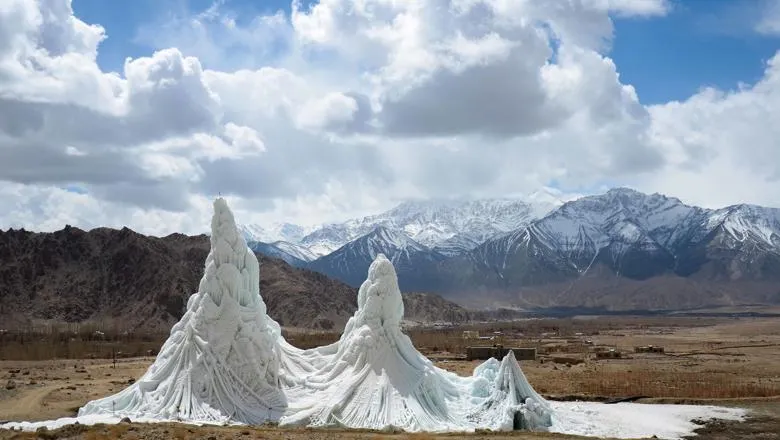This project is innovative, multidisciplinary and eye-catching because it speaks to the solutions-orientation and global reach of the research we would like to foster at King’s.
Professor Frans Berkhout, Assistant Principal (King’s Climate & Sustainability)
27 July 2023
Project to limit the impact of melting glaciers on nearby people and systems
A new research project led by King’s is working to better support the people and systems downstream of glaciers and limit the melting taking place due to global warming.

The project, ‘Elemental adaptation: water and energy security from artificial ice reservoirs’, will examine the extent to which communities can adapt to the profound transformations of glaciers due to global warming.
Drs Tom Matthews and George Adamson, from the Department of Geography, will be leading a team investigating the potential of mimicking natural glacier growth through the construction of Artificial Ice Reservoirs (AIRs), to help safeguard water supplies in at-risk mountain communities.
Due to global warming, glacier-fed mountain regions face critical risks from loss of freshwater. Glaciers retain precipitation in winter and release it in summer, redistributing water between seasons and protecting against drought.
This means that glaciers play an important role in maintaining the freshwater security of the more than two billion people living downstream of them, worldwide. It also highlights the need to adapt to the ongoing glacier retreat – even if global warming is limited to ‘only’ 2°C, glaciers worldwide are expected to shrink by 60 % of their current extent.
The King’s researchers will investigate whether using modern technology to build AIRs could help protect water supplies against this glacier retreat – and with minimal energy and storage costs.
Throughout the 15-month project, the team will retain a focus on the extent to which their ideas could be scaled up to enhance the water resource security for potentially hundreds of millions of people worldwide.
The widespread retreat of glaciers worldwide represents a profound and unintended experiment with the freshwater security of hundreds of millions of people worldwide. Even if we stopped warming now, we would still likely see glaciers shrink by 40-50 %. This is the stark reality we are faced with. A big factor in how disruptive this is to communities worldwide is how well we can adapt. Artificial Ice Reservoirs are already being tried as part of the solution in a few regions worldwide. We’re excited to now find out how far this could go.
Dr Tom Matthews, Senior Lecturer in Environmental Geography
The project received a grant from the King’s Climate and Sustainability seed fund and is built on the interdisciplinary strengths of the King’s Water Centre and King’s Climate Hub.
Project collaborators include Dr Wei He (Department of Engineering), Dr Nithya Natarajan (Department of International Development) and Professor Daanish Mustafa (Department of Geography). The team also benefit from collaborations with Acres of Ice and with academics from Utrecht and Freibourg universities.
The King’s Climate and Sustainability seed fund is a £2.5 million investment by King’s to stimulate new research related to climate and sustainability.




